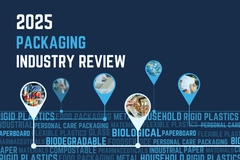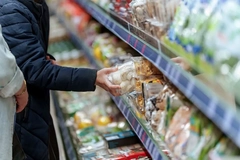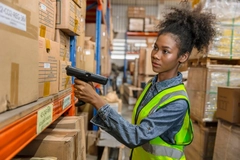ECOS joins NGOs calling on EU to include plastic in ecodesign product regulation
Forty-one European organizations have submitted an open letter to the European Commission (EC) criticizing the decision to exclude plastic and polymers from its list of intermediate product priorities in the first working plan for the Ecodesign for Sustainable Products Regulation (ESPR).
According to the letter, adding plastic and polymers to the list is important to reducing environmental harm, improving regulatory compliance, and strengthening the EU’s leadership role in the global push to reduce dependence on plastic.
Packaging Insights discusses the open letter and the ESPR with Emily Best, program manager at the Environmental Coalition on Standards (ECOS), one of the key NGOs behind the letter, which works to defend environmental interests in the development of standards and product regulations.
“At ECOS, we’ve been working for many years on the ecodesign of various products in the previous Ecodesign Directive, and we’ve been contributing to the policy process of the development of the new ESPR from the beginning,” says Best.
She explains that this legislation will put in place sustainability requirements on many different types of products and will eventually affect nearly all products sold in the EU. The EC will present its list to the new Ecodesign Forum for stakeholders to discuss at the end of February.
“Some products were already mentioned in the ESPR text, but that text gave discretion to the EC to add or subtract additional products, provided that justification was given. There are two categories on this list of products. One includes consumer products, such as textiles. The other [category] is intermediate products, which consumer products are made from, for example, steel.”
“Add plastic to the list”
Best tells us that while plastic and polymer by-products are included on the list of consumer products, plastics and polymer should be included in the intermediate product category.
 ECOS wants plastic and polymers on the ESPR list of intermediate product priorities.“Others on this list of intermediate products include paper, paper and cardboard, and chemicals, for a long time now. Alongside our partner organizations, who are also involved in the open letter, the Break Free From Plastic movement, and the Rethink Plastic Alliance, we have been advocating for the Ecodesign of plastics for many years. We think that that sector should be included in the first working plan of the ESPR.”
ECOS wants plastic and polymers on the ESPR list of intermediate product priorities.“Others on this list of intermediate products include paper, paper and cardboard, and chemicals, for a long time now. Alongside our partner organizations, who are also involved in the open letter, the Break Free From Plastic movement, and the Rethink Plastic Alliance, we have been advocating for the Ecodesign of plastics for many years. We think that that sector should be included in the first working plan of the ESPR.”
She says that last summer, ECOS and other partner organizations conducted a study to find out more about the justifications given by the EC as to why plastic and polymers are not already on the priority list.
“It was a very technical study with technical results, but we found that the sector had more areas of improvement than were mentioned in the EC’s study, particularly in terms of emissions to air and water and biodiversity effects.”
“Now we know that in the process of the ESPR, we’re about to embark on this new period with the Ecodesign Forum coming together for its first meeting, and that’s where stakeholders will discuss this list.”
Another point highlighted in the letter and by Best is that other stakeholders have also mentioned the plastic and polymers sector as one to prioritize, including industry representatives and the respondents of an open public consultation that took place as part of a priority product study.
“This was about last year, the open public consultation, but the EC’s Research Center did summarize the fact that many of the stakeholders listed the plastics and polymer sector as their priority sector to be addressed.”
Impacting regulation
Best further discusses how the privatization of plastics and polymers in the ESPR would affect the packaging but industry.
“Within the Packaging and Packaging Waste Regulation, there are the requirements to introduce design for recycling, technical specifications, and we see that the ESPR work could complement that work and address the sector from the bottom up,” she argues.
“This could make sustainable packaging more of a coherent work stream. It can all be achieved together in the same timeframe.”
“This will help to provide regulatory certainty to the sector instead of addressing packaging and textiles over here. There can be an overall addressing of the sector.”
 Prioritizing plastic would strengthen the EU’s leadership role in the plastic treaty (Image credit: UNEP).UN Global Plastic Treaty role
Prioritizing plastic would strengthen the EU’s leadership role in the plastic treaty (Image credit: UNEP).UN Global Plastic Treaty role
The ECOS expert argues that adding plastic and polymers to the ESPR intermediate product priority list would strengthen the EU’s leadership role in global negotiations, such as the UN Global Plastic Treaty.
“Throughout these negotiations in the Global Plastic Treaty, we have seen that the EU has been a strong leader with high ambition. And, of course, we support that, and we support their efforts,” says Best.
“Addressing the sector in the ESPR would show even more global leadership that the EU is not just advocating for these measures in the future globally, but that also at home, they’re putting it into practice,” she continues.
“This can help the sector set the pathway for how to do it and show that it can be done. Overall, I think that this would help the EU have an even stronger negotiating position by saying: ‘We are working to minimize the problems of plastic production, plastic use, and waste.’”
Best mentions that the current political climate in the US is making these negotiations even more difficult, and adds: “Now is the time to step up even more and say that we can lead on this, and change can happen. There are frameworks and mechanisms to make these changes.”












